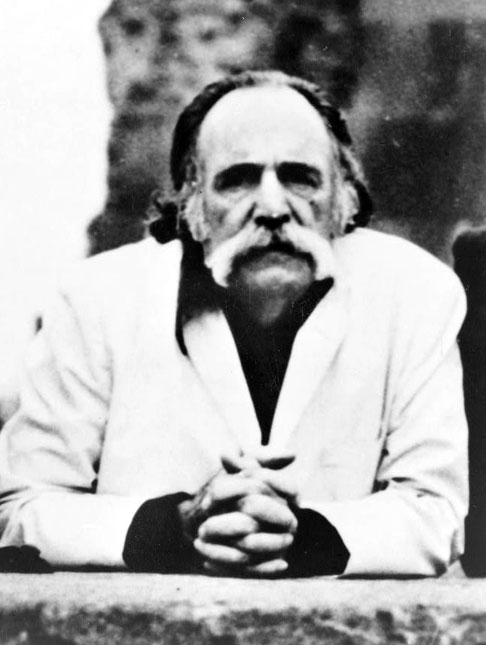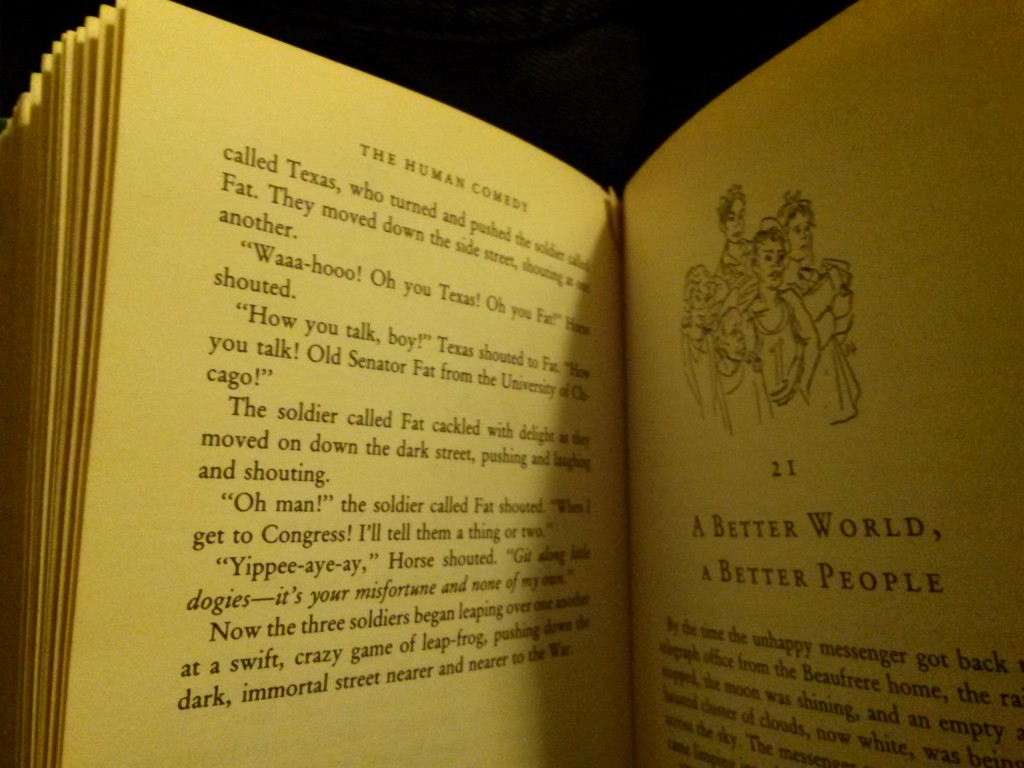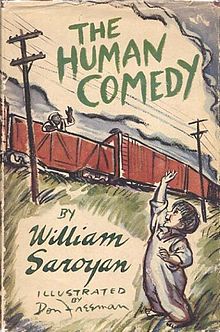
It’s a legend. The Pulitzer Prize-winning dramatist was fired from MGM’s film The Human Comedy in 1943. So he adapted his screenplay into a novel, and released it when the film premiered. Then the film was ultimately nominated for five Oscars (including “Best Picture”) and won the “Best Story” Oscar for its fired writer himself, William Saroyan. Later, Louis B. Mayer would recall this as his all-time favorite film…
But Amazon tipped me off to another shocking chapter in the story about the story. More than 20 years later, in 1966, William Saroyan revised his novel yet again — and it was released as a shorter Dell paperback. “The Human Comedy is one of the most beautifully written books I’ve ever read,” wrote one reviewer on Amazon, “so when I opened this paperback version, I was devastated to realize that the unthinkable had occurred– the text had been altered!” 53 different Amazon customers nodded their virtual agreement to the criticism — or at least, marked the review as helpful. “The ending that I had so cherished in an old hardback version had been hastily re-written, going so far as to conclude with a completely different final sentence.”
This review led me to my own comparison of the two editions — and I’ve created a table documenting just how different the two editions are. Entire passages have been deleted, about the music of the world, and about how nothing good ever really ends. “I do not know how a publisher could in good conscience alter the work of such an extraordinarily gifted writer…” the Amazon reviewer complained. “The Human Comedy is an incredibly moving book and, unfortunately, this paperback edition does not do it justice.”

The hardback edition was 291 pages long, the paperback just 192. But now a community of readers — the book’s invisible fans — were inspiring me. I spent a few weekends immersing myself in both books, savoring William Saroyan’s stirring portrayal of small-town America — and of life itself. (I’m not the only fan of this novel. Tom Hanks will be appearing in a new movie of the book coming out in December, which will also star Meg Ryan and Sam Shepherd…)
There were some more startling secrets in other Amazon reviews. One schoolteacher had lived near the real California town on which Saroyan based the book. After 42 years of teaching, she’d retired, and then in 1999 visited Amazon to share her own insights. The telegraph office described in the novel — as well as the winery — were both real-life businesses which she’d had her students locate on a map! And she announced that she’d be collaborating with Saroyan’s grand-niece on a college course sharing memories about the famous novelist.
Another Amazon reviewer wrote that she’d read the book three times, each at a different point in her life, and each time finding that it had a different flavor. (“This book is like wine; it becomes vintage as you get older…”) But she also shared another fascinating piece of trivia. Saroyan lost his father at an early age, and his uncle — who became a father figure to him — “was taken to war and that was the last he saw of him.” Throughout his novel, the young children in the family grapple with the absence of their own father. “Saroyan dedicated the story to his mother. This is a key element of the story…”
I have my own piece of trivia to share. The same year that the book was published, William Saroyan was married — and he seems to have named one of the characters after his wife. Throughout the novel, a telegram boy worries about his older brother Marcus, who is serving in World War II. In 1943, William Saroyan married a woman named Carol Marcus.
It’s fun to participate in this giant conversation about a cherished novel. “I admit I cried at the end of it,” wrote one reviewer. And another wrote enthusiastically that this was truly “The Great American Novel.” (“Read it or suffer a less fulfilling life than you could have had…”)
Just make sure that you’re reading the right edition!
